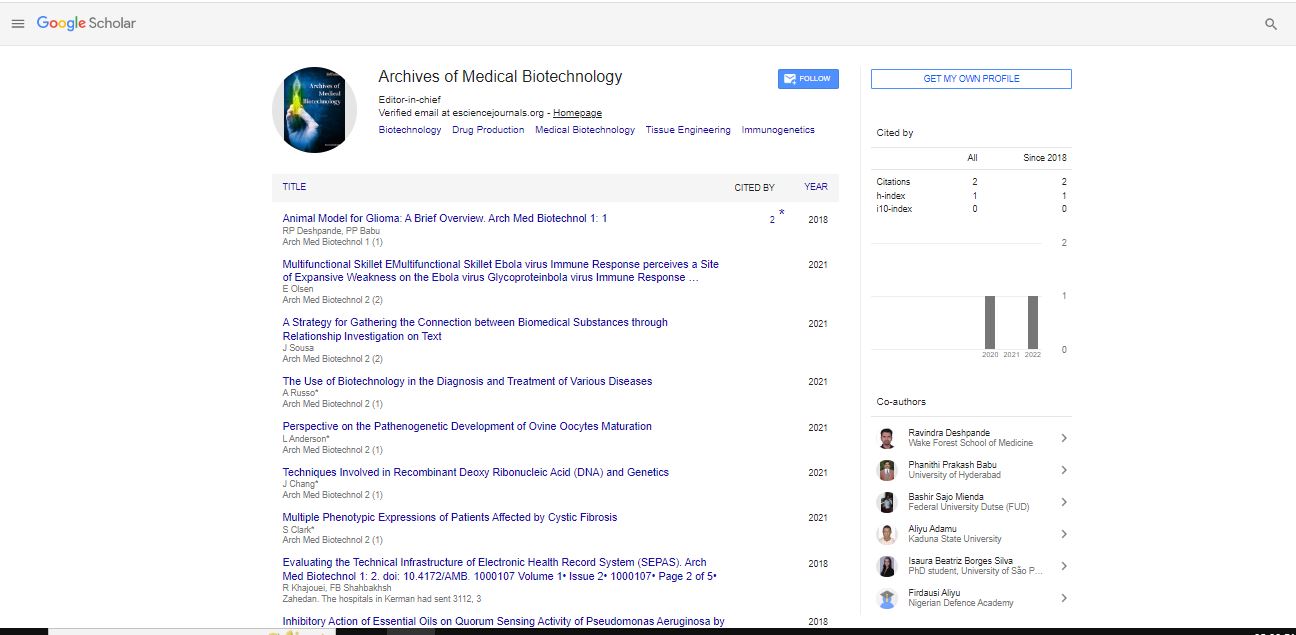Commentary, Arch Med Biotechnol Vol: 4 Issue: 3
Advancements in Biotechnology: The Evolution of Medical Devices
Savinen Matteo*
1Department of Pharmacy, Georges Pompidou European Hospital, Paris, France
*Corresponding Author: Savinen Matteo,
Department of Pharmacy, Georges
Pompidou European Hospital, Paris, France
E-mail: savinen1@aphp.fr
Received date: 30 August, 2023, Manuscript No. AMB-23-117781;
Editor assigned date: 01 September, 2023, PreQC No. AMB-23-117781 (PQ);
Reviewed date: 15 September, 2023, QC No. AMB-23-117781;
Revised date: 22 September, 2023, Manuscript No. AMB-23-117781 (R);
Published date: 02 October, 2023, DOI: 10.4172/amb.1000056
Citation: Matteo S (2023) Advancements in Biotechnology: The Evolution of Medical Devices. Arch Med Biotechnol 4:3.
Description
The field of biotechnology has made significant strides in the development of medical devices over the years. These innovative devices have revolutionized healthcare by enhancing diagnosis, treatment, and patient care. Biotechnology-driven medical devices are designed to improve the accuracy, efficiency, and overall quality of healthcare, benefiting both patients and healthcare professionals. This article explores the development of medical devices in the field of biotechnology, highlighting their impact on modern healthcare. Biotechnology is the application of biological principles and techniques to develop products and technologies that improve human health. In the context of medical devices, biotechnology plays a pivotal role in the design, development, and production of devices that leverage biological and biochemical processes. These devices often integrate cutting-edge technologies, such as genomics, proteomics, and nanotechnology, to offer novel solutions for healthcare challenges.
Diagnostic devices
One of the most significant contributions of biotechnology to healthcare is the development of advanced diagnostic devices. For example, DNA sequencers and genetic testing platforms have revolutionized the diagnosis of genetic diseases and predispositions. These devices enable healthcare providers to make more accurate and personalized treatment decisions. Additionally, advancements in pointof- care testing have led to the creation of portable diagnostic devices that can provide rapid results, which is particularly important in emergencies and remote healthcare settings.
Imaging devices
Biotechnology has greatly improved medical imaging technologies. Devices like MRI machines, CT scanners, and ultrasound systems have benefited from biotechnological advancements, resulting in higher resolution, reduced exposure to harmful radiation, and more precise image analysis. Furthermore, the integration of Artificial Intelligence (AI) algorithms into medical imaging devices has enhanced their diagnostic capabilities, enabling early detection of diseases and more tailored treatment strategies.
Drug delivery systems
The development of biotechnology-driven drug delivery systems has transformed the way medications are administered. Devices like insulin pumps, drug-eluting stents, and controlled-release systems offer precise dosing, improved drug efficacy, and reduced side effects. These innovations have significantly improved the lives of patients with chronic conditions.
Prosthetic and implantable devices
Biotechnology has played a crucial role in enhancing prosthetic limbs and implantable medical devices. Prosthetic limbs can now be customized to match an individual's unique requirements and provide a more natural range of motion. Implantable devices, such as pacemakers and cochlear implants, benefit from biotechnological advancements in materials and miniaturization, resulting in longerlasting and more effective solutions.
Telemedicine devices
Biotechnology has also paved the way for telemedicine devices that enable remote monitoring of patients' health. These devices, such as wearable fitness trackers and remote patient monitoring systems, can provide real-time data to healthcare professionals, allowing for early intervention and more personalized care.
Conclusion
Biotechnology-driven medical devices have transformed the healthcare landscape, offering innovative solutions for diagnosis, treatment, and patient care. These devices leverage the power of genomics, proteomics, nanotechnology, and artificial intelligence to improve accuracy and efficiency in healthcare. However, the development of these devices also raises ethical and regulatory considerations that must be carefully addressed. As biotechnology continues to advance, it holds the promise of even more revolutionary breakthroughs in medical device development, ultimately leading to better patient outcomes and improved quality of life. The field's continued collaboration between scientists, healthcare professionals, and regulatory bodies will be essential in ensuring that these advancements are harnessed responsibly and ethically for the benefit of all.
 Spanish
Spanish  Chinese
Chinese  Russian
Russian  German
German  French
French  Japanese
Japanese  Portuguese
Portuguese  Hindi
Hindi 